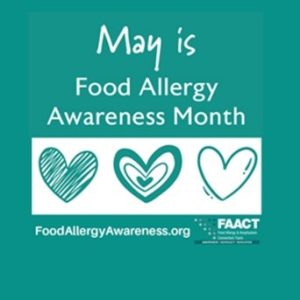By Jill Hollingsworth, VP, Food Safety and Retail Industry Relations, Ecolab

In recognition of Food Allergy Awareness Month, we are providing a brief refresher on the facts about food allergens and what retailers should know about this important issue.
What are Food Allergens?
Food allergens are food proteins that can cause an allergic reaction in some people. Although these proteins are not harmful to most people, to some sensitive individuals they can be life-threatening. A food allergy occurs when the body’s immune system mistakenly responds to a specific food protein as if it were harmful, causing allergic symptoms. Allergic reactions are caused by the production of antibodies called Immunoglobulin E (IgE). The symptoms and severity of allergic reactions to food can be different between individuals and can be severe.
Although not the same as an allergy, another immune-mediated condition is Celiac disease. This is a chronic digestive disorder that damages the small intestine. Celiac disease is caused by an immune reaction to the consumption of gluten, a protein found in wheat, barley, and rye.
Exposure to food allergens can occur through ingesting the food, inhalation (such as breathing in peanut dust), and even contact (such as using an allergen-containing skin care product). Not all people who react to a certain food have an allergy. They may have a food intolerance or sensitivity, such as lactose intolerance, gluten (non-Celiac) intolerance, or sulfite sensitivity. Food intolerance does not involve the immune system. Food intolerance is due to a chemical deficiency (usually due to lack of a specific enzyme) and causes problems with digestion. The symptoms can be unpleasant, but they are rarely life-threatening.
What Are the Major Food Allergens?
Eight foods or food groups account for most serious allergic reactions in the US. These are:
- Milk
- Eggs
- Fish
- Crustacean shellfish
- Wheat
- Soy
- Peanuts
- Tree nuts
Sesame: On April 23, 2021, the Food Allergy Safety, Treatment, Education, and Research (FASTER) Act was signed into law, declaring sesame as the 9th major food allergen recognized in the US. This change will become effective on January 1, 2023. Labeling of sesame as an allergen will be required as of that date, although many foods containing sesame are already being labeled.
Allergens are the number one cause of food recalls. Most of these recalls are due to improper or inadequate labeling. Remember that consumers depend on accurate labeling information to help them avoid foods that could threaten their health, and even their life.
Symptoms
According to the Food Allergy & Anaphylaxis Connection Team (FAACT), in the US, about 26 million adults and 6 million children have food allergies. There is no cure for allergies.
The most common sites of allergic reactions are the mouth (swelling of the lips), digestive tract (stomach cramps, vomiting, diarrhea), skin (hives, rashes, or eczema), and the airways (wheezing or breathing problems). Anaphylaxis, the most dangerous symptom, is a sudden and severe allergic reaction that can lead to severe respiratory problems, shock, and even death. These reactions may happen within minutes, or they may not appear for several hours.
Because there is no preventive treatment, the only course is strict avoidance of an offending food.
For some individuals, allergic reactions can be so severe that they carry an Epipen to treat sudden allergic reactions with a drug called epinephrine. Epinephrine works quickly to improve breathing, stimulate the heart, raise a drop in blood pressure, reverse hives, and reduce swelling of the face, lips, and throat.
Allergen Awareness in Retail Facilities
The FDA Food Code specifies that the “Person in Charge” in a retail food establishment should be trained in food allergy awareness. This includes:
- Awareness of the serious nature of food allergies
- Symptoms and signs of an allergic reaction, including anaphylaxis
- Knowing the nine major food allergens
- Understanding food allergen ingredients and labeling requirements
Depending on their duties, other employees, especially those working in fresh departments, may also need to be trained so they are fully aware of the allergen management plan and can assist customers when needed. Consumers and caregivers dealing with allergens rely heavily on not just food labels, but also on the protocols and practices within your store.
Food allergen management in a retail facility can be complex, and we cannot cover all the details in this brief article. A management plan must address an array of issues including FDA mandatory labeling requirements, cleaning and sanitizing, food ingredients, recipes and preparation, avoidance of cross-contamination, packaging, menus and signage – just to name a few.
Now is a good time, during Food Allergen Awareness month, to ask if your management plan is up to date and if your employees are current on allergen training. Training is the best tool to ensure associates are knowledgeable, aware, and in compliance; and it is the best way to protect your customers.
As part of the NGA, Ecolab Food Safety Partnership, find a short allergen training included in our Digital training page (Digital Training – National Grocers Association). For more comprehensive allergen training, visit Food Allergens | Content | Lobster Ink.
Additionally, find a food allergens poster here: Food-allergens-poster.pdf (widen.net) to use in your store to keep this important topic top of mind.
For more information on Food Allergy Awareness Week visit https://www.foodallergyawareness.org/education/food-allergy-awareness-initiatives/food-allergy-awareness-week-month/
Brought to you by NGA’s Food Safety Partner,

